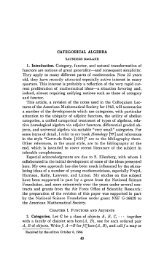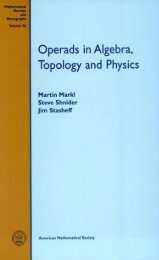Symmetric Monoidal Categories for Operads - Index of
Symmetric Monoidal Categories for Operads - Index of
Symmetric Monoidal Categories for Operads - Index of
Create successful ePaper yourself
Turn your PDF publications into a flip-book with our unique Google optimized e-Paper software.
182 11 <strong>Symmetric</strong> <strong>Monoidal</strong> Model <strong>Categories</strong> <strong>for</strong> <strong>Operads</strong><br />
Pro<strong>of</strong>. Similar to proposition 11.5.3. ⊓⊔<br />
In usual cases, we use the next observation to prove that a category E has<br />
regulartensorpowers:<br />
11.6.5 Observation. Suppose the class <strong>of</strong> B-c<strong>of</strong>ibrations is created by a<br />
<strong>for</strong>getful functor U : E→Bwhich preserves colimits, c<strong>of</strong>ibrations, and weakequivalences.<br />
The category E has regular tensor powers with respect to B-c<strong>of</strong>ibrations<br />
if, <strong>for</strong> every n ∈ N, thenfold pushout-product λ(i) :Ln(Y/X) → Tn(Y/X)<br />
defines a c<strong>of</strong>ibration (respectively, an acyclic c<strong>of</strong>ibration) in the projective<br />
model category <strong>of</strong> Σn-objects in B whenever i is a B-c<strong>of</strong>ibration (respectively,<br />
an acyclic B-c<strong>of</strong>ibration) in E.<br />
The examples <strong>of</strong> reduced categories with regular tensor powers introduced<br />
in this book arise from:<br />
11.6.6 Proposition. The category <strong>of</strong> connected Σ∗-objects M 0 has regular<br />
tensor powers with respect to C-c<strong>of</strong>ibrations.<br />
Pro<strong>of</strong>. Let M ∈M 0 .In[14,§1.3.7-1.3.9] we observe that the object M ⊗r (n)<br />
expands as a sum <strong>of</strong> tensor products M ⊗r (n) = �<br />
(I1,...,Ir) M(I1)⊗···⊗M(Ir)<br />
where (I1,...,Ir) ranges over partitions I1 ∐···∐Ir = {1,...,n} so that<br />
Ik �= ∅, <strong>for</strong> every k ∈{1,...,r}. The symmetric group Σr operates on M ⊗r (n)<br />
by permuting the factors <strong>of</strong> the tensor product N(I1) ⊗···⊗N(Ir) andthe<br />
summands <strong>of</strong> the expansion. The assumption Ik �= ∅ implies that Σr acts<br />
freely on partitions (I1,...,Ir). As a corollary, we have an isomorphism <strong>of</strong><br />
Σr-objects<br />
M ⊗r � �<br />
�<br />
(n) � Σr ⊗ M(I1) ⊗···⊗M(Ir)<br />
(I1,...,Ir) ′<br />
where the sum ranges <strong>of</strong> representative <strong>of</strong> the coset <strong>of</strong> partitions (I1,...,Ir)<br />
under the action <strong>of</strong> Σr (see loc. cit. <strong>for</strong> details).<br />
From this assertion, we deduce readily that the category <strong>of</strong> connected Σ∗objects<br />
M 0 satisfies the assumption <strong>of</strong> observation 11.6.5. Hence we conclude<br />
that M 0 has regular tensor powers with respect to C-c<strong>of</strong>ibrations. ⊓⊔<br />
11.6.7 Remark: The Example <strong>of</strong> Simplicial Modules. Proposition<br />
11.5.3 can also be improved in the context <strong>of</strong> simplicial modules ∗ .<br />
According to [9], the natural extension <strong>of</strong> any functor F : k Mod → k Mod<br />
to the category <strong>of</strong> simplicial k-modules maps a weak-equivalence between<br />
c<strong>of</strong>ibrant objects to a weak-equivalence. From this result, it is easy to deduce<br />
that assertion (a) <strong>of</strong> proposition 11.5.3 holds <strong>for</strong> every Σ∗-object in simplicial<br />
k-modules M and not only <strong>for</strong> c<strong>of</strong>ibrant Σ∗-objects.<br />
∗ Observe however that the category <strong>of</strong> simplicial sets does not satisfies the axiom <strong>of</strong><br />
regular tensor powers.






